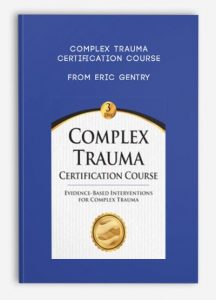 Complex Trauma Certification Course from Eric Gentry
Complex Trauma Certification Course from Eric Gentry
More information about Medical:
Medicine is the science and practice of establishing the diagnosis, prognosis, treatment, and prevention of disease.
Medicine encompasses a variety of health care practices evolved to maintain and restore health by the prevention and treatment of illness.
Contemporary medicine applies biomedical sciences, biomedical research, genetics, and medical technology to diagnose, treat, and prevent injury and disease,
typically through pharmaceuticals or surgery, but also through therapies as diverse as psychotherapy, external splints and traction, medical devices, biologics, and ionizing radiation, amongst others.
Medicine has been around for thousands of years, during most of which it was an art (an area of skill and knowledge) frequently having connections to the religious and
philosophical beliefs of local culture. For example, a medicine man would apply herbs and say prayers for healing, or an ancient philosopher and physician would apply bloodletting according to the theories of humorism.
In recent centuries, since the advent of modern science, most medicine has become a combination of art and science (both basic and applied, under the umbrella of medical science).
While stitching technique for sutures is an art learned through practice, the knowledge of what happens at the cellular and molecular level in the tissues being stitched arises through science.
Outline:
Foundations of Complex Trauma (C-PTSD)
Essentials of C-PTSD
Adaptations to C-PTSD
Overview of Tri-Phasic Model
Assessment & Treatment of C-PTSD
Therapist Preparation
- Self-regulation of ANS dysregulation and optimization of treatment delivery
- Informed consent for C-PTSD
Assessment Skill Building
- Quantitative assessment instruments and clinical interview sufficient to accurately diagnose C-PTSD and develop preliminary treatments & case planning
- Mental status exam for C-PTSD
- Monitor treatment effectiveness & identify treatment shortcomings
- First-session interventions to enhance safety, stabilization, positive expectancy and therapeutic relationship
Stage One: Safety & Stabilization
- Assessment Skills Building (Safe vs. Not Safe)
- Case Management (External vs. Internal danger)
- Therapeutic relationship
- Stabilization
- Common/Generic Stabilization Skills for C-PTSD
- Specialized Skills for Safety & Stabilization
- Group applications for safety & stabilization/resilience with C-PTSD
- Empirical criteria for successful completion of Stage 1 with C-PTSD clients
Stage Two: Remembrance & Mourning/Trauma Resolution
- CBT skills to lessen avoidance, arousal, shame, dysphoria, reactivity, and distorted thinking symptoms
- Compare current evidence-based/evidence-informed treatments utilized to address symptoms of C-PTSD
- Trauma-Focused CBT
- Cognitive Processing Therapy
- Prolonged Exposure
- Eye-Movement Desensitization & Reprocessing (EMDR)
- Accelerated Resolution Therapy/Brainspotting
- Somatic Experiencing
- Sensorimotor Therapy
- Emotional Freedom Techniques/Energy Psychology
- Internal Family Systems
- Structural & Strategic Treatment for Dissociative Disorders
- Ego-State Therapy
- Treatment Skills Practice
- Attachment Trauma
- Somatization
- Dissociation
- Psychoeducation/Cognitive Restructuring
- Self-Regulation/Relaxation
- Imaginal Exposure Techniques (IFS, NLP Reframing, Frazier’s Dissociative Table)
Stage Three: Reconnection/Resilience/Posttraumatic Growth
- Strategies for accomplishing:
- Sustaining stabilization
- Self-regulation of physiology
- Self-regulation of behaviors
- Self-regulation of emotions
- Meaning-making
- Reconnection
- Posttraumatic growth
- Spiritual maturation
- New opportunities
- Greater strength
- Greater appreciation
- New Relationships
- Forward-Facing Trauma Therapy – Healing the Moral Would (Gentry)
- Self-regulation & Direct Therapeutic Exposure (DTE)
- Covenant & code of honor
Closure: Lessons Learned
Description:
Become a Certified Clinical Trauma Professional in Complex PTSD (CCTP-II) and demonstrate your expertise in treating this population of trauma clients.
While the focus of many trauma trainings is to acquire the basic skills for treating posttraumatic stress, the focus of this intensive Certification Course recording is acquiring skills for effectively treating those challenging clients with complex posttraumatic stress, or C-PTSD.
You will learn evidence-based practices to help heal complex trauma, including difficult symptoms such as intense abreactions/flashbacks; severe “depression-like” shutdown and avoidance; dissociation; relational difficulties and challenges; chronic emotional and somatic dysregulation; chronic pain and psychotic symptoms.
You will leave this recording with a new structure you can apply to the entire treatment course for someone with C-PTSD that pulls from today’s most effective trauma treatment modalities. You will learn how to accelerate treatment with this all-encompassing model, instead of getting stuck trying to use just one trauma treatment modality that may not work for every client.


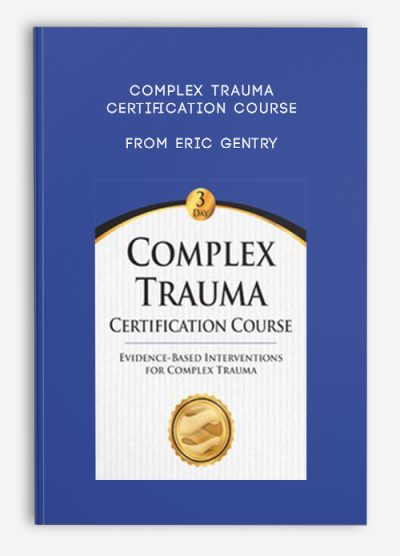

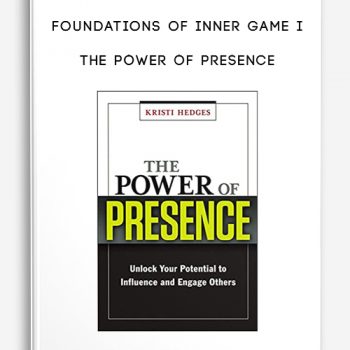




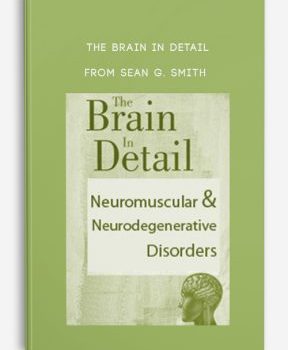


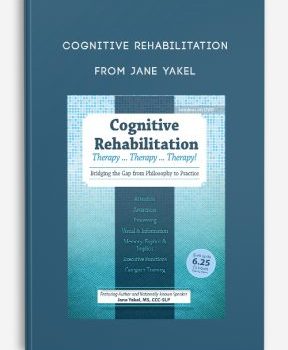
tristian –
This is Digital Download service, the course is available at Coursecui.com and Email download delivery.